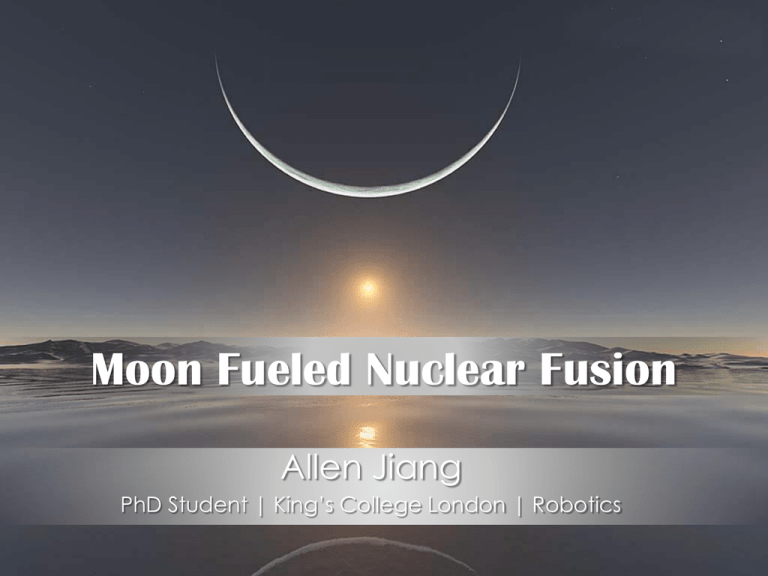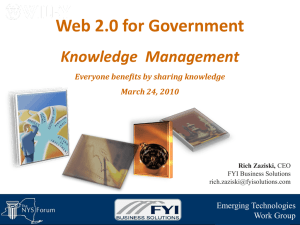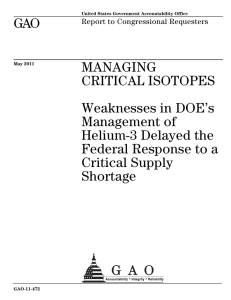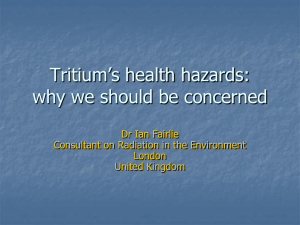the powerpoint presentation
advertisement

Moon Fueled Nuclear Fusion Allen Jiang PhD Student | King’s College London | Robotics Energy-Industrial Complex • • • • • Charcoal – Bronze Age (2000BC) Coal – Industrial Revolution (1700s) Oil – Petroleum Age (1900s) Nuclear Fission – Atomic Age (1950s) Renewable Energy – Modern Day • What’s next? Fusion is the future • Energy from active stars, the most fundamental source of energy in the universe • Counter to fission, it is clean and safe • Extremely efficient • Flexible and sustainable Heavy water, tritium, and helium-3 – Deuterium, heavy hydrogen, hydrogen-2, 2D • 1 Proton, 1 Neutron • Abundant • Stable, non-radioactive – Tritium, triton, hydrogen-3, 3T • 1 Proton, 2 Neutrons • Rare, 225 kg world supply • Radioactive, decays into Helium-3 (12-year half-life) – Helium-3, 3He • 2 Protons, 1 Neutron • Rare (on Earth) • Stable, non-radioactive Current Technology: Deuterium + Tritium reaction -> 17.6 MeV Future Technology: Deuterium + Helium-3 reaction -> 18.3 MeV Helium-3 + Helium-3 reaction -> 12.9 MeV Current Progress • International Thermonuclear Experimental Reactor (ITER) – Tokamak construction began in 2010 • National Ignition Facility (NIF) – Lawrence Livermore National Laboratory – October 2010 test – 1.5 MJ delivered to target by laser – 1.2 MJ required for fusion ignition (D-T) The moon • 1 million tons of He-3 on the lunar surface • This amount will produce energy (D-He3) which is 10 times the amount of all of Earth’s fossil fuels, and 2 times the amount of all of Earth’s uranium Mining • The 6 manned lunar landings brought back over 380 kg of rocks and soil • Bigelow Aerospace plans to launch its BA 330 module in 2014 • NASA has completed work on its new Space Exploration Vehicle • NASA’s Robonaut 2 is on board the ISS undergoing testing Transport • May 2010, NASA begins Project Morpheus, contracts Armadillo Aerospace for a lunar lander • November 2010, Ad Astra Rocket Company runs test on VASIMR (Variable Specific Impulse Magnetoplasma Rocket) • April 2011, SpaceX announced the Falcon Heavy Cost effectiveness • The Apollo project cost $136 billion, and employed 400,000 people • NASA Apollo research provided a 33% return on investment through direct economics boosts to the USA • A world’s supply of He-3 would generate $300 billion per year Challenges • Public is wary of nuclear proliferation • Space travel is too expensive • Energy today is already being fulfilled Big picture Harvesting the moon for Helium-3 will: • Provide ample clean, safe energy • Create many new jobs • Advance research in new technology “By exploring other worlds we safeguard this one. By itself, I think this fact more than justifies the money our species has spent in sending ships to other worlds. It is our fate to live during one of the most perilous and, at the same time, one of the most hopeful chapters in human history.” – Carl Sagan Today, the foundation exists to achieve fusion, space travel, and beyond. References • • • • • • • • • • • • • • • • • • • • http://en.wikipedia.org/wiki/Energy_industry • http://www.lbl.gov/abc/Basic.html • http://en.wikipedia.org/wiki/Nuclear_fusion • http://en.wikipedia.org/wiki/Helium-3 • http://en.wikipedia.org/wiki/Lunar_soil http://en.wikipedia.org/wiki/Tritium • http://en.wikipedia.org/wiki/Solar_wind http://en.wikipedia.org/wiki/Space_Exploration_Vehicle http://en.wikipedia.org/wiki/Binding_energy http://en.wikipedia.org/wiki/Apollo_program https://lasers.llnl.gov/programs/nic/ http://news.bbc.co.uk/1/hi/8485669.stm http://www.iter.org http://lasers.llnl.gov/ http://www.asi.org/adb/02/09/he3-intro.html http://www.wired.com/science/space/news/2006/12/72 276 http://www.space.com/11311-spacex-huge-privaterocket-moon-mars.html http://morpheuslander.jsc.nasa.gov/ http://www.armadilloaerospace.com/n.x/Armadillo/Ho me http://en.wikipedia.org/wiki/NASA_Budget#Cost_of_pro ject_Apollo http://en.wikipedia.org/wiki/Variable_specific_impulse_ magnetoplasma_rocket http://www.adastrarocket.com/aarc/VASIMR http://en.wikipedia.org/wiki/BA_330 http://en.wikipedia.org/wiki/Energy_crisis http://en.wikiquote.org/wiki/Carl_Sagan








